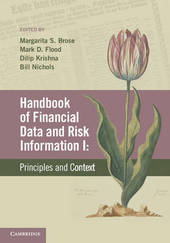
|
Handbook of Financial Data and Risk Information I: Volume 1: Principles and Context
Hardback
Main Details
| Title |
Handbook of Financial Data and Risk Information I: Volume 1: Principles and Context
|
| Authors and Contributors |
Edited by Margarita S. Brose
|
|
Edited by Mark D. Flood
|
|
Edited by Dilip Krishna
|
|
Edited by Bill Nichols
|
| Physical Properties |
| Format:Hardback | | Pages:658 | | Dimensions(mm): Height 254,Width 180 |
|
| Category/Genre | Finance
Management and management techniques |
|---|
| ISBN/Barcode |
9781107012011
|
| Classifications | Dewey:368 |
|---|
| Audience | | Tertiary Education (US: College) | |
|---|
| Illustrations |
40 Tables, black and white; 2 Halftones, unspecified; 50 Halftones, color; 4 Line drawings, unspecified
|
|
Publishing Details |
| Publisher |
Cambridge University Press
|
| Imprint |
Cambridge University Press
|
| Publication Date |
9 January 2014 |
| Publication Country |
United Kingdom
|
Description
Risk has always been central to finance, and managing risk depends critically on information. As evidenced by recent events, the need has never been greater for skills, systems and methodologies to manage risk information in financial markets. Authored by leading figures in risk management and analysis, this handbook serves as a unique and comprehensive reference for the technical, operational, regulatory and political issues in collecting, measuring and managing financial data. It will appeal to a wide range of audiences, from financial industry practitioners and regulators responsible for implementing risk management systems, to system integrators and software firms helping to improve such systems. Volume I examines the business and regulatory context that makes risk information so important. A vast set of techniques and processes have grown up over time, and without an understanding of the broader forces at work, it is all too easy to get lost in the details.
Author Biography
Margarita S. Brose has 20 years of experience in financial services. She began her career as an attorney at the US Securities and Exchange Commission. After earning an MBA, she specialized in risk and compliance consulting with PwC and IBM. She has degrees from Barnard College, George Washington University Law School and The Wharton School. Mark D. Flood did his undergraduate work at Indiana University in Bloomington, where he majored in finance (BS, 1982), and German and economics (BA, 1983). In 1990, he received his PhD in finance from the Graduate School of Business at the University of North Carolina at Chapel Hill. He has worked as a Visiting Scholar and Economist in the Research Department of the Federal Reserve Bank of St Louis, an Assistant Professor of Finance at Concordia University in Montreal, a Visiting Assistant Professor of Finance at the University of North Carolina at Charlotte, a Senior Financial Economist in the Division of Risk Management at the Office of Thrift Supervision, a Senior Financial Economist with the Federal Housing Finance Agency, and most recently as a Research Principal with the US Office of Financial Research in Washington, DC. His research interests include financial markets and institutions, systemic financial risk, financial data management, securities market microstructure, and bank market structure and regulatory policy. His research has appeared in a number of publications, including the Review of Financial Studies, the Annual Review of Financial Economics, the Journal of International Money and Finance, Quantitative Finance, and the St Louis Fed's Review. Dilip Krishna is a Director with the Governance, Risk and Regulatory Consulting practice at Deloitte and Touche LLP, with a focus on risk architecture and information. He is involved in several regulatory initiatives such as stress testing and capital management implementations. He has seventeen years of experience across a range of wholesale and retail banking products in banks across North America. Previously, Krishna was a partner with Teradata Corporation, leading its North-East Banking and Capital Markets consulting team. He worked with many large banks in the North-East to implement some of their largest data warehouse and data management programs. Krishna was also Director of Teradata's Risk Management Center of Expertise in the Americas, responsible for working with many large financial institutions across the USA and Canada implementing Basel II and risk management solutions. In this role he was also active with Teradata's Government Services team, helping to articulate the role of analytics in regulation and transparency, including being called upon to offer expert testimony to the US Congress. He has served as chief architect for Basel II at a major Canadian bank, and has implemented front-offices trading solutions in Canadian capital markets operations. Krishna is widely published in the area of risk information and risk architecture. Bill Nichols has been at the intersection of technology and finance for twenty-five years. He co-founded and served as CEO of a research firm acquired by Thomson Financial in 1995, and spent the following seven years with Thomson. Subsequently, he spent three years in venture capital related organisations, followed by consulting stints for major banks, asset management firms, and securities exchanges. He has participated as an expert in multiple ISO standards groups and is the former Convenor of the ISIN Standard for financial instruments. With Mark Flood, he co-chaired the Data Committee of the Committee to Establish the National Institute of Finance. Currently a Senior Advisor for Information Architecture and Innovation at the Office of Financial Research, he was previously Data Architect at Bridgewater Associates in their Data Research group.
|